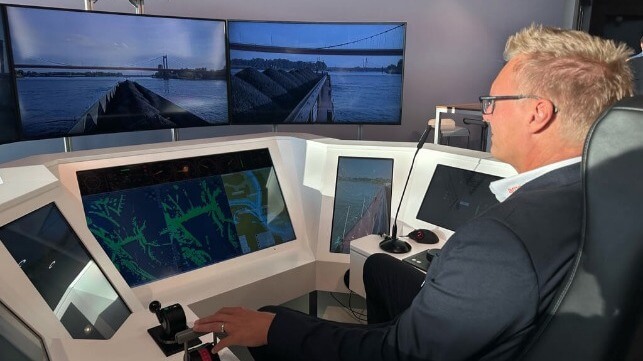Inland Waterway Cargo Vessel Remotely Controlled from German Trade Fair

Visitors to the German National Maritime Conference in September got the opportunity to watch an inland waterway cargo ship operating fully remotely. It was the culmination of a three-year effort, the FereBin research project, which designed and demonstrated remote-controlled vessel operations.
Lars Reckers, a technical manager at Rhenus Shipping Management highlights the strong advantages of remote-controlled operations. He points to the emerging shortage of specialist workers required to operate vessels as well as the ability to extend the vessel’s operating times. He points out that the technology makes it possible to fully steer and operate the vessel from the remote-control center. He even imagines a time when skippers might work from home making the profession “more family friendly.”
Rhenus launched the FernBin project in conjunction with several other project partners, including Argonics, the DST (the Development Centre for Ship Technology and Transport Systems), the University of Duisburg-Essen and RWTH Aachen University, in 2020. The goal was to create extensive inland waterway shipping operations using remote controls.

Ernst Kramer, a 345-foot inland waterway cargo ship was set up to operate remotely (FernBin)
The vessel that they outfitted with the remote capability is the Ernst Kramer, a 345-foot inland cargo ship built in 1974. The vessel operates on Mitsubishi diesel engines and can transport over two million tonnes of cargo.
The vessel was outfitted with a sensor and camera system with all the data being transmitted over a Starlink connection that was installed to ensure uninterrupted data transmission. The project also converted control systems aboard the vessel so that the remote operator has full control. Among the systems and controls that were made remotely available are the ability to adjust the rpm of the main engine, control the vessel’s transmission including the clutch, and the position of the rudder, while monitoring the vessel’s position with the radar signal and cameras.
They completed a test voyage for the Ernst Kramer on July 6 and 7. The vessel started in Rotterdam and traveled nearly 30 miles to Willemstad. During the trial voyage, they tested the sensor integration and the remote controls.
Video from the July 2023 trial voyage (SmartShipping/LinkedIn)

that matters most
Get the latest maritime news delivered to your inbox daily.
For the conference at the Bremen Trade Fair Center, the FernBin project created a remote-control center along with cameras making it possible for attendees to watch the vessel as it was traveling from the Port of Duisburg and in the Ruhr estuary via a live link. Bernard Buche and Herbert Berger, Managing Director Rhenus Schiffsmanagement, took turns controlling the Ernst Kramer while attendees followed the progress on the video monitors.
The FernBin research project will continue until the end of this year. The participants are seeking an extension for a further three months to continue their demonstrations. They are currently working on an adaptive navigation system that will react dynamically to the surrounding traffic and process traffic information in real-time. The goal is to create a module to assist the remote-controlled operations by predicting and visualizing the space required for the encounter of ships and showing the ship's captain possible options in a predictive mode. According to the project managers, this will allow the skipper to navigate the ship safely and reliably depending on the behavior of other surrounding vessels.
